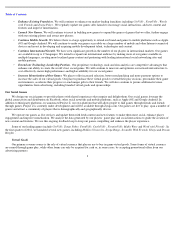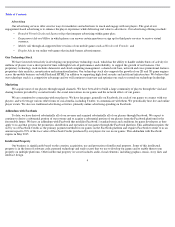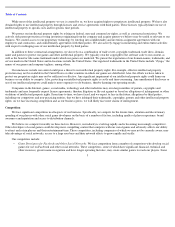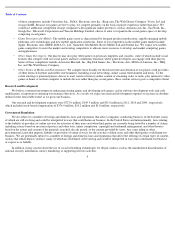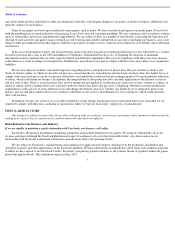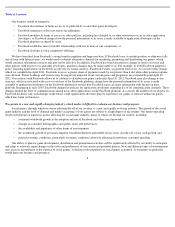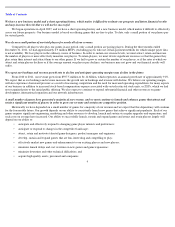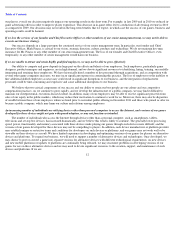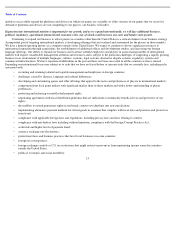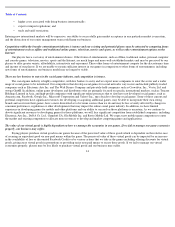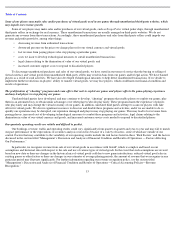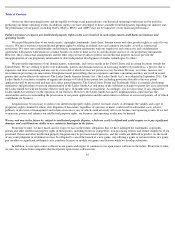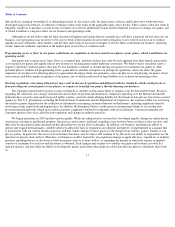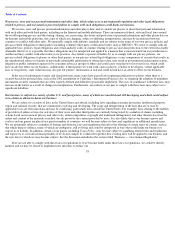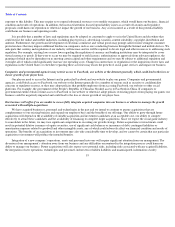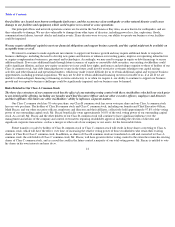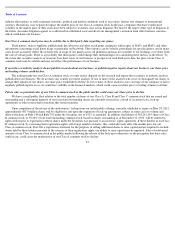Zynga 2011 Annual Report Download - page 17
Download and view the complete annual report
Please find page 17 of the 2011 Zynga annual report below. You can navigate through the pages in the report by either clicking on the pages listed below, or by using the keyword search tool below to find specific information within the annual report.
Table of Contents
unable to successfully expand the platforms and devices on which our games are available, or if the versions of our games that we create for
alternative platforms and devices are not compelling to our players, our business will suffer.
Expansion into international markets is important for our growth, and as we expand internationally, we will face additional business,
political, regulatory, operational, financial and economic risks, any of which could increase our costs and hinder such growth.
Continuing to expand our business to attract players in countries other than the United States is a critical element of our business strategy.
An important part of targeting international markets is developing offerings that are localized and customized for the players in those markets.
We have a limited operating history as a company outside of the United States. We expect to continue to devote significant resources to
international expansion through acquisitions, the establishment of additional offices and development studios, and increasing our foreign
language offerings. Our ability to expand our business and to attract talented employees and players in an increasing number of international
markets will require considerable management attention and resources and is subject to the particular challenges of supporting a rapidly growing
business in an environment of multiple languages, cultures, customs, legal systems, alternative dispute systems, regulatory systems and
commercial infrastructures. We have experienced difficulties in the past and have not been successful in all the countries we have entered.
Expanding our international focus may subject us to risks that we have not faced before or increase risks that we currently face, including risks
associated with:
13
•
recruiting and retaining talented and capable management and employees in foreign countries;
•
challenges caused by distance, language and cultural differences;
•
developing and customizing games and other offerings that appeal to the tastes and preferences of players in international markets;
•
competition from local game makers with significant market share in those markets and with a better understanding of player
preferences;
•
protecting and enforcing our intellectual property rights;
•
negotiating agreements with local distribution platforms that are sufficiently economically beneficial to us and protective of our
rights;
•
the inability to extend proprietary rights in our brand, content or technology into new jurisdictions;
•
implementing alternative payment methods for virtual goods in a manner that complies with local laws and practices and protects us
from fraud;
•
compliance with applicable foreign laws and regulations, including privacy laws and laws relating to content;
•
compliance with anti
-
bribery laws including without limitation, compliance with the Foreign Corrupt Practices Act;
•
credit risk and higher levels of payment fraud;
•
currency exchange rate fluctuations;
•
protectionist laws and business practices that favor local businesses in some countries;
•
foreign tax consequences;
•
foreign exchange controls or U.S. tax restrictions that might restrict or prevent us from repatriating income earned in countries
outside the United States;
•
political, economic and social instability;


